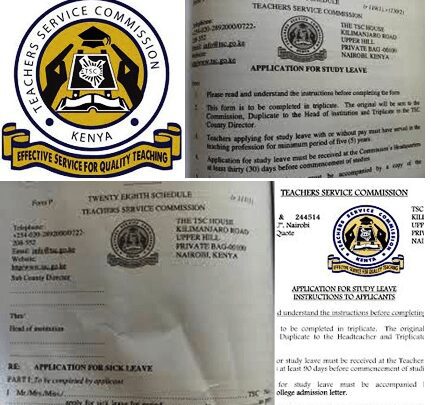Did you receive more salary from the Teachers Service Commission (TSC) this month, than you had expected? This may be probably an error if you did not anticipate a salary increment and it may be as a result of a salary over payment. It is important to note, though, that the Commission can increase your salary after a promotion, salary increment in a CBA phase and in case of arrears; among other scenarios.
TSC recovers all salary over payments to teachers. A salary over payment occurs when a teacher, past or present, receives money to which he/she is not entitled.
An over payment may be the result of late advice to payroll, incorrect or misinterpreted advice by the officer’s responsible, late reporting of changes affecting a teacher’s pay, incorrect documentation and processing or system error among others.
Salary over payment may also occur for a variety of reasons ranging from absence and desertion of duty, exit of employment, professional misconduct resulting to a disciplinary process, involvement in criminal activities leading to court action, administrative errors, untimely processing of official leave such as study leave and sick leave among others.
Although over payments may occur through no fault of the employee concerned, the Commission has an obligation to recover such over payments and manage funds efficiently and effectively in accordance with the Financial Management Act regardless of the cause of the overpayment and to recover any amount paid to an employee to which they were not entitled with or without their consent until amount is repaid in full.
It is good for you to understand that over payment of salary and subsequent recovery of over payments will impact on your future earnings and put you into a serious financial strain. You should therefore exercise due diligence by notifying the employer about any incorrect payment once identified, refund the money or negotiate and agree to a repayment plan within a reasonable time frame.
To be on the safe side, upon discovery of salary over payment, you are supposed to notify the Commission immediately and refund the extra salary. Over payment is computed as gross earnings less statutory deductions where applicable and not on net pay.
Related news;
- TSC payslips online- Here are all the answers to your questions on T-pay
- TSC payslip online 2021/2022; Login, download payslips and update your profile
- TSC payslips online; Login, register and download payslips (T-pay portal https://tpay.tsc.go.ke/)
Summary of situations that can cause salary over payment for teachers.
| S/N | Cause for salary over payment | Description on how salary over payment is determined |
| 1 | Absence | Overpayment shall be computed as basic salary for the number of days the employee is absent. There shall be no reductions with any statutory deduction. |
| 2 | Desertion | Overpayment shall be computed as basic salary plus all allowances less statutory deductions to give the net overpayment. |
| 3 | Resignation | If an employee resigns while on probation, s/he shall be give seven (7) days’ notice or pay equivalent of seven (7) days’ salary in lieu of notice. If an employee resigns after probation, one (1) months’ notice shall be given in writing or payment of one (1) month’s salary in lieu of notice. |
| 4 | Transfer of service | Any employee who is offered employment in the public service shall be required to submit the following documents: An application in writing, A copy of the appointment letter and A clearance certificate. Upon submission of the above requirements, the Commission shall issue last pay certificate and a formal release letter. |
| 5 | Retirement | Salary overpayment may occur if an employee remains on payroll after compulsory retirement. It is recorded as basic salary plus allowances less statutory deductions. Any employee who may wish to retire voluntarily from service shall be required to give three months’ notice in writing or pay one month’s salary in lieu of notice. |
| 6 | Death | A salary overpayment may occur if a teacher remains on payroll after death. It and shall be computed from the next day after the date of death until date of removal from payroll. However, the house allowance for the month of death shall be paid in full. |
| 7 | Economic Crimes and other serious offences | Any employee who is confined in lawful custody shall not be entitled to any payment during that period. However, after being charged with the offence in the court of law, s/he shall be suspended from work from the date they were charged and shall be entitled to half (½) basic salary, medical allowance and house allowance. Any overpayment that occurs during this period shall be computed if an employee is on payroll on full salary after the date of the charge. |
| 8 | Professional Misconduct | This includes but is not restricted to negligence of duty, insubordination, infamous conduct and exam irregularities. Once an employee has been interdicted for any of these offenses, s/he is entitled to half (½) basic salary plus house allowance until the determination of the case. Any overpayment that occurs shall be computed if an employee is paid full pay during the period of interdiction |
| 9 | Other offences | These include but not restricted to immoral behaviour, misappropriation or mismanagement of funds, use of fake certificates, forgery, impersonation, collusion and chronic absenteeism. Any employee interdicted for these offenses shall not be entitled to any pay hence put on zero salary. Any overpayment that occurs if an employee remains on payroll after the interdiction date shall be computed on full basic salary plus all allowances less statutory deductions. |
| 10 | Leave | The Commission may grant different types of leaves to its employees that include annual leave, sick leave, study leave, special leave, compassionate leave, maternity and paternity leave. An overpayment may occur if an employee remains on payroll after failing to report back for assignment of duties upon expiry of the specified leave. This overpayment shall be computed as basic salary plus allowances less statutory deductions. |
Detailed explanations on circumstances when salary over payment may occur
Absence
Over payment shall be computed as basic salary for the number of days the employee is absent. There shall be no reductions with any statutory deduction.
Desertion
Over payment shall be computed as basic salary plus all allowances less statutory deductions to give the net over payment.
Exits from Service
An over payment may occur if an employee remains on payroll after the date of exit from service due to resignation, transfer of service, dismissal or retirement. An over payment shall be recorded as basic salary plus allowances less statutory deductions.
(a) Resignation
- If an employee resigns while on probation, s/he shall be give seven (7) days’ notice or pay equivalent of seven (7) days’ salary in lieu of notice.
- If an employee resigns after probation, one (1) months’ notice shall be given in writing or payment of one (1) month’s salary in lieu of notice.
(b) Transfer of service
Any employee who is offered employment in the public service shall be required to submit the following documents:
- An application in writing.
- A copy of the appointment letter.
- A clearance certificate.
Upon submission of the above requirements, the Commission shall issue last pay certificate and a formal release letter.
(c) Retirement
- Salary overpayment may occur if an employee remains on payroll after compulsory retirement. It is recorded as basic salary plus allowances less statutory deductions.
- Any employee who may wish to retire voluntarily from service shall be required to give three months’ notice in writing or pay one month’s salary in lieu of notice.
(d) Death
A salary over payment may occur if a teacher remains on payroll after death. It and shall be computed from the next day after the date of death until date of removal from payroll.
However, the house allowance for the month of death shall be paid in full.
(e) Economic Crimes and other serious offences
Any employee who is confined in lawful custody shall not be entitled to any payment during that period. However, after being charged with the offence in the court of law, s/he shall be suspended from work from the date they were charged and shall be entitled to half (½) basic salary, medical allowance and house allowance.
Any over payment that occurs during this period shall be computed if an employee is on payroll on full salary after the date of the charge.
(f) Professional Misconduct
This includes but is not restricted to negligence of duty, insubordination, infamous conduct and exam irregularities. Once an employee has been interdicted for any of these offenses, s/he is entitled to half (½) basic salary plus house allowance until the determination of the case.
Any over payment that occurs shall be computed if an employee is paid full pay during the period of interdiction.
(g) Other offences
These include but not restricted to immoral behavior, misappropriation or mismanagement of funds, use of fake certificates, forgery, impersonation, collusion and chronic absenteeism. Any employee interdicted for these offenses shall not be entitled to any pay hence put on zero salary.
Any over payment that occurs if an employee remains on payroll after the interdiction date shall be computed on full basic salary plus all allowances less statutory deductions.
Leave
The Commission may grant different types of leaves to its employees that include annual leave, sick leave, study leave, special leave, compassionate leave, maternity and paternity leave.
An over payment may occur if an employee remains on payroll after failing to report back for assignment of duties upon expiry of the specified leave. This over payment shall be computed as basic salary plus allowances less statutory deductions.
(a) Sick leave
In a case where an employee is on a prolonged sickness, the sick leave shall be granted as follows:
- First three (3) months the employee to granted full pay,
- Next three (3) months the employee to be granted ½ basic salary with full allowances,
- After six (6) months the employee to be granted sick leave without pay
until resumption date.
An over payment shall be computed where the above conditions are not adhered to.
(b) Study leave without pay
Salary over payment may occur if an employee remains on payroll after proceeding on unpaid study leave. Such an over payment shall be computed on basic salary plus all allowances from the date the teacher stops teaching until date of removal from the payroll.
How TSC prevents Salary Over payment
The Commission has adopted various preventive, control and recovery strategies as well as sanctions to mitigate the risk of incurring salary over payments. These strategies are explained below.
1. Prevention strategies
The Commission shall implement the following preventive mechanisms to minimize occurrence of salary over payments:
- Regularly sensitize secretariat staff and heads of institution about their roles and responsibilities in curbing salary over payments.
- Induction of all newly employed secretariat staff and heads of institution on their roles and responsibilities in the prevention and control of salary over payments.
2. Control strategies
The Commission has put in place appropriate internal control measures to reduce the occurrence of salary over payments, which include but not limited to compiling and timely submission of the entry and exit reports for immediate action.
The following strategies shall apply:
(a) Payroll verification
- Human Resource and Personal Emolument shall verify IPPD DCSs information against pay entries on payroll to ensure that there are no salary over payments.
- IPPD shall carry out pre-audit of the payroll to detect anomalies before processing of the payroll.
(b) Payroll cleansing
The commission shall update and maintain TIMIS data on real time basis in order to validate teachers’ payroll.
3. Segregation of duties
The commission shall assign various activities to different officers in order to create checks and balances.
4. System access rights
The systems shall have access rights assigned to different personnel according to their responsibilities.
5. Data analysis
Analysis of prevalence of causes of salary overpayments shall be done and reports on findings shared with the management for decision making.
6. Risk management
Service areas shall identify risks in their processes, propose and implement mitigation measures.
7. Internal audit
The directorate of internal audit shall conduct periodic audits to:
- Give assurance to the Board on the effectiveness of internal controls put in place.
- Ensure that management undertakes annual review of controls to monitor and address emerging issues.
How TSC recovers salary over payments
The teachers’ employer has adopted various strategies to redeem salary over payments, which include but not limited to:
- Recovering salary over payments of at least 1/3 of the basic salary for all employees on payroll and ensuring each employee retains 1/3 of their basic salary as their net pay.
- Full recovery of all outstanding over payment from salary arrears and any balance thereof through the payroll.
- Use of pay increment and/or salary adjustment to adjust the rate of recovery of salary over payment.
- Notifying employee upon discovery of any over payment by use of a demand letter.
- Initiating proceedings to follow up salary over payments from employees who have exited service.
- Recommending for write-off for any irrecoverable over payment in accordance with Section 157 of the Public Finance Management Act, 2015. These shall include the Commission secretary being satisfied that:
a. Reasonable steps are taken to recover the losses and that the loss is irrecoverable.
b. Further efforts to recover the loss would be uneconomical:
c. It would be to the advantage of the Commission to effect a settlement of its claim or waive the claim.
Note: If the employee leaves the commission before all the over payment has been recovered, the full amount of any outstanding balance will immediately become due and payable in accordance with the government regulations.
All TSC employees shall be expected to exercise trust and act in good faith whenever over payment occurs. Lack of good faith will be implied if an employee who is aware of an over payment:
- Suppressed a material fact that affected the amount payable;
- Deliberately or carelessly failed to ensure that relevant information affecting the amount payable was received by the Commission;
- Knowingly failed to bring an overpayment to the Commission’s attention;
- Failed to make enquires or check employment particulars with the Commission when they could reasonably have done so;
- Failed to notify the Commission of an obvious error;
- Failure to act in good faith shall be considered as a serious offence that could lead to disciplinary action and criminal proceedings.
Disciplinary action over salary over payments
Disciplinary action shall be taken against any employee found culpable of causing an over payment of salary in accordance with the Code of Regulation for Teachers and Human Resource Policies and Procedure Manual for secretariat staff (2018).
Regulation 168 of CORT and 134 (5) Human Resource Policies and Procedure Manual for secretariat staff stipulates that a head of institution or supervisor who fails to report an employees’ exit shall be liable to disciplinary action and surcharged to the extent of any loss occasioned to the commission.
In order to institute a surcharge against any employee who cause salary overpayments, the following guidelines shall apply:
- Where salary over payments have been declared irrecoverable, the Commission shall recover the amount in full from the employee(s) who occasioned the loss.
- Where the salary over payment is recoverable, a surcharge equal to the Central Bank interest rate may be levied.
- Whereupon Director Human Resource Management and Development (HRM&D) and/or Director, Field Services (FS) find an employee/staff culpable of causing salary over payments, the matter will be referred for disciplinary action.
The Commission in collaboration with other State Agencies may recommend institution of criminal proceedings against ANY suspected employees and their accomplices.
Quick TSC Links
TSC Teachers Online
Access adverts, entry/exit returns and teacher registration services
Update Profile
Update biodata and additional documents
TSC TPAD
Access Teacher Perfomance, Appraisal & Development
Pension Status
View pension claims that have been delivered to the Treasury
T-PAY
Access payslips, P9 for tax returns and 3rd party services
TSC FAQs
Get answers to recurrent questions about general HR issues
TSC Teacher Recruitment and Selection
TSC Determination of a discipline case




